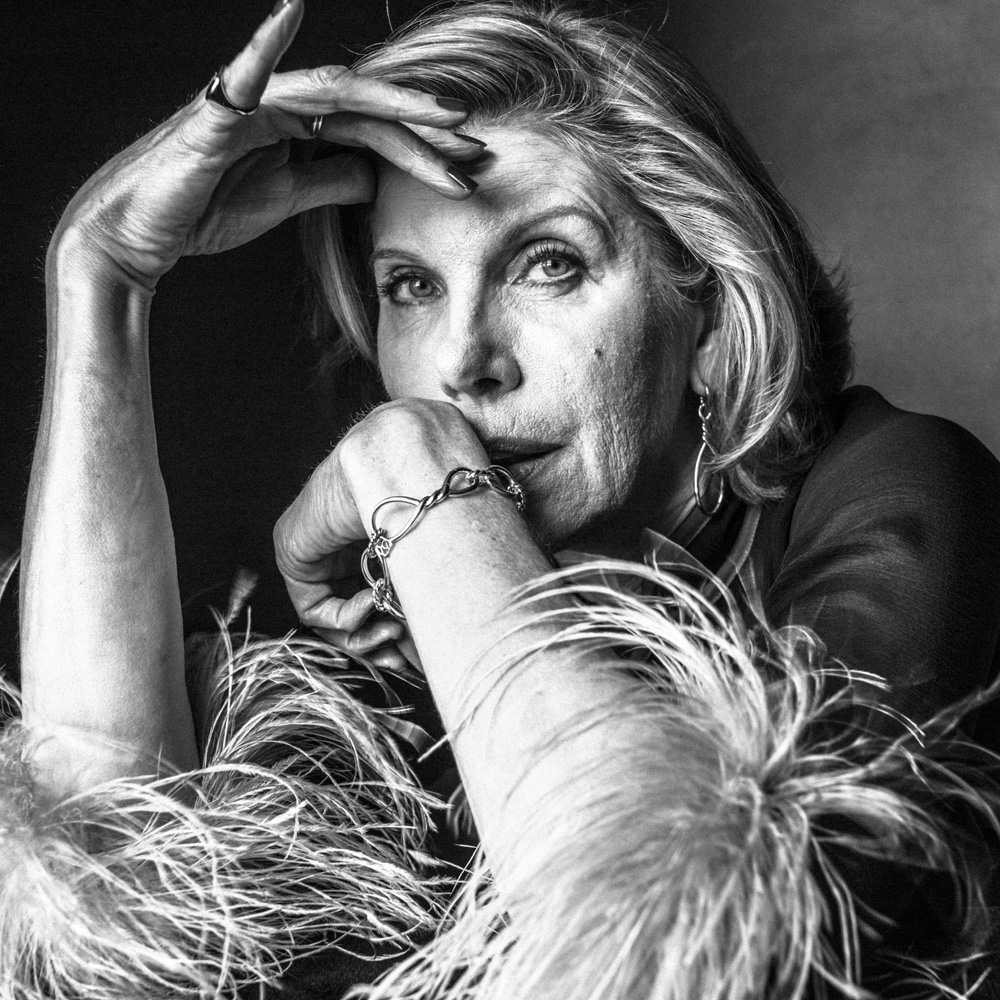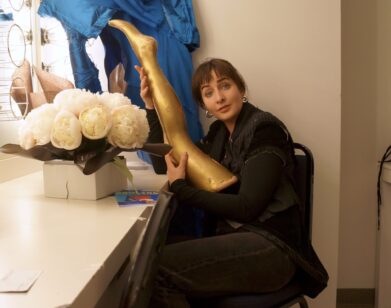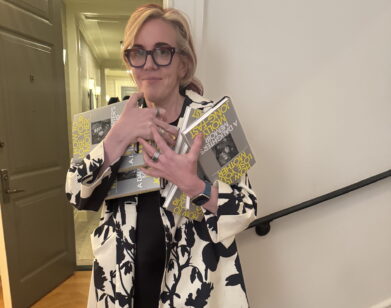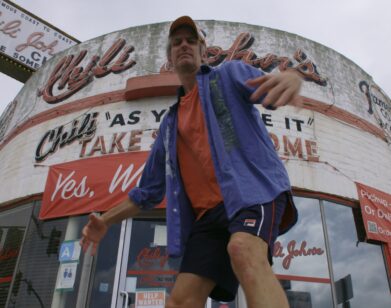Christine Baranski
To say that Christine Baranski is a throwback to a certain kind of preternaturally poised, classic actress, in the style of a Joan Crawford or a Rosalind Russell, is but a testament to the strong performances she has turned in, all flavored with her own special élan, over more than four decades of working in show business. No matter the size of the role, whether in a comedy, musical, or drama, she can be trusted to steal the scene.
Since her Broadway debut in Hide and Seek in 1980, the Juilliard-trained performer has worked with the stage’s greats, appearing in Tom Stoppard‘s The Real Thing in 1984 and Neil Simon’s Rumors in 1988 (and earning a Tony for both), and has held her own onscreen for directors such as Mike Nichols (The Birdcage, 1996), Rob Marshall (Chicago, 2002, and Into the Woods, 2014), and Warren Beatty (Bulworth, 1998). Television, too, has been a space for Baranski to show her versatility. She credits her Emmy Award-winning martini-swilling character Maryann, on the ’90s sitcom Cybill, for opening the doors to her film career, and from 2009 until last year, Baranski portrayed the tough, sophisticated Chicago lawyer Diane Lockhart on CBS’s scandal-rife legal drama The Good Wife.
Last February, the network announced that The Good Wife’s seventh season would be its last, but there was something to look forward to on the horizon: a new spin-off, premiering this month, titled The Good Fight, in which Diane transitions from supporting character to star. Baranski, at 64 years old, has finally nabbed the weighty leading role she deserves, one befitting the elegance and strength she exudes. In December, the fashion designer Zac Posen called up Baranski, who splits her time between a home in Connecticut and an apartment on Manhattan’s Upper East Side, to chat about, among other things, Diane’s parallels to Hillary Clinton, the fickle nature of beauty, and finding one’s “essential self.”
ZAC POSEN: I was trying to think when we first met, and then I was reading your bio, and I guess I first experienced you in 1983, in Sunday in the Park [With George].
CHRISTINE BARANSKI: You saw the workshop?
POSEN: I don’t know. Then I didn’t see you.
BARANSKI: No, I was only in the workshop, and I was in a play called The Real Thing. Mike Nichols saw me in the workshop of Sunday in the Park, and then I auditioned for The Real Thing, which meant that I couldn’t do the Broadway production of Sunday in the Park. But I also got pregnant. You probably saw Dana Ivey. How long have you been in the city?
POSEN: I’m a SoHo born-and-raised kid. So my parents dragged me to lots of museums, and for birthdays and any kind of celebration, we’d go to the theater.
BARANSKI: Well, that’s why you are who you are.
POSEN: Have you ever had a character from one story or TV show, through the evolution of that show, develop into their own storyline and show?
BARANSKI: You mean what’s happening with The Good Wife and The Good Fight?
POSEN: Yeah.
BARANSKI: No, this is utterly unique. It’s serendipitous. On a number of levels, I was so blessed to do the character of Diane Lockhart when we did it seven, now eight years ago. But the show lasted seven years. I had finished doing nine months of Boeing-Boeing, a French farce, on Broadway. I said to my manager, because I was in my fifties, “It would be really great to do a dramatic role and play someone elegant and intelligent. There aren’t that many roles out there, but …” I have a kind of remarkable ability to, for want of a better phrase, get what I want. I kind of project. I guess it’s called dreaming.
POSEN: I do it as well.
BARANSKI: I think it’s kind of amazing. I put it out there, and in fact, I could argue that as a young woman in Buffalo, New York, I dreamed that the best thing that could possibly happen would be to become a New York sophisticated actress. I remember watching Lauren Bacall accept a Tony Award for Applause, and I thought, “Hmmm …”
POSEN: I could see you in Applause.
BARANSKI: They tried to revive it. I did a reading once. But back to dreaming: I really projected that that would be the best trajectory for my career. Lo and behold, she says that there’s one pilot out there. It’s called The Good Wife. You know pilots; you only get a little bit of a sense of what a character is, particularly if it’s a supporting role. I looked at it, and I had to go meet with the director. I happened to be in L.A. speaking for Chuck Lorre who was getting a star on Hollywood Boulevard. On my way from there to the airport, I met The Good Wife team and had a great meeting, and the rest is history. I played Diane Lockhart for seven years, and it came to that point of, “Are we going to renew the show or not?” The predominant response with The Good Wife from people on the street was always, “Such intelligent writing. Such intelligent female characters.” I thought, “God. I’m loath to lose that.” We were a great crew. We shoot in Greenpoint, Brooklyn. It means I can live in New York and have my home life in Connecticut. There were so many reasons why I would not want to let that go. Then they made the announcement that they were going to end the show because, artistically, they felt as thought they had played out the arc of Julianna [Margulies]’s storyline. They were very smart about, “Let’s not try and recycle old plot lines.” It was time to end the show, but they were trying to do a spin-off. They just didn’t know how, or if, so it was all kind of on hold. But once again, I put it out there. “Gosh, I would really like to do it if they can spin this a certain way.” At the time, the show was moving towards an all-female law firm. In the spring, I thought, “Oh, we’ll probably have a female president. Will it be interesting if we do a show if it has to do with women in power?” Well, we’ve seen how that’s all played out.
POSEN: Are you in the midst of shooting?
BARANSKI: We are, darling. We started in October. The good news is that [The Good Wife creators] Robert and Michelle [King] are now totally onboard for all ten episodes. How they decided to spin it is really, really interesting. Diane is at the top of her game.
POSEN: But the Diane character, how is she going to evolve? What can you give us?
BARANSKI: I’ll tell you quite quickly what the pilot is: I think the very first scene, which they’ve added since the election happened, is her watching Donald Trump getting sworn in. She is so distraught; she’s a renowned Chicago liberal lawyer. Anyway, she decides to buy a house in the South of France and retire. You see her announcing to the law firm that she’s retiring; she’s calm and she’s happy, and her goddaughter has come aboard from law school; she’s welcomed her into the law firm. Diane is just relaxed and happy. She’s made a break with her husband, the ballistics expert, because he cheated on her. She’s moving on with her life. Then the story breaks that her close friends were Madoff-like people in Chicago, and she loses all her money. Quite simply, she is decimated financially.
POSEN: Obviously, the character has a significant evolution over the seven years on television. From a personal standpoint, I very much related to Diane and this role. I related it to my mother who became a corporate lawyer, a partner, on Wall Street.
BARANSKI: No kidding.
POSEN: Were there any people, through the creation of the character, that you or the writers were looking at that held this legal presence?
BARANSKI: I certainly drew on Hillary [Clinton]’s story because she did study law. From the pilot, there’s this picture of Hillary and me standing next to each other; it was photoshopped. I’ve certainly talked to a lot of female law professors and a lot of women who were in the legal profession. I sat in at the courthouse and went to the Brooklyn DA’s office and did that kind of homework, but I culled from a lot of women in my generation and a little younger than me, who really were dealing with the glass ceiling. You certainly saw it in the journalistic world, and you can certainly see it in show business. There are the Diane Sawyers, and finally, she got to be an anchorwoman. It was a slow, slogging journey.
POSEN: It’s so ridiculous that it’s still an issue.
BARANSKI: Honestly, when the show was written, the presumption was that Hillary Clinton was going to be the president. In fact, they wrote a line in the first episode where I announce that I’m retiring to the entire law firm at this beautiful, huge circular table, and I say that there are no more glass ceilings to break. I think that we’re going to have to loop it and they’re going to have to amend that line. I even had a scene where, after I lose all my money, and my own firm won’t even let me back because I have a tainted reputation because I was linked to these Madoff-like people, there’s a scene in which I’m packing my office and I take the photo which is on my desk, and it’s the picture of Hillary and me. We shot that scene the night before the election, and I said to the director, “Gosh, I’m sure that we’ll have a female president tomorrow, and probably when I look at that photo, I’ll think that if she can pick herself up time and time again and move on, Diane is probably thinking that she’ll just move on.” Lo and behold, the next day, things had taken a dramatically different turn. I think what’s going to happen is that the writers are going to address this in the course of this show. It’s uncanny that they’ve written that Diane has a fall from power. Suddenly, you have three or four scenes where I’m looking for work and no one will hire me.
POSEN: I think this is all very real.
BARANSKI: When they conceived of this show and when they wrote the pilot, the election had not happened. So for me, this show is so serendipitous that it’s hit the epicenter of what is going on in the culture. The one firm that will hire me is the only African-American law firm in Chicago. So I walk in as a white woman. The majority of the people at that law firm are African Americans. So this show will have the opportunity to address not only the feminist issues, ageism, and sexism, but it’s going to address racism in the workplace.
POSEN: I think there’s an interesting balance, because I think inherently you possess, whether desired or not, an inner glamour and panache. You mentioned Lauren Bacall earlier, and I think that it’s interesting that that, also, can be presented to the public. It’s all in there.
BARANSKI: Intrinsic to the success of The Good Wife and the character Diane, and I don’t mean this superficially, but it was particularly her style; women were absolutely captivated. As many times as I would get comments about the writing of the show, I would get comments on how she was dressed. Even when she was going through the worst times in her life or going through bankruptcy at the firm, that’s when she dressed up. She put it out there.
POSEN: She used the power of fashion.
BARANSKI: The power of fashion, and the power of what you present visually. Women would come up and ask me about a piece of jewelry, a brooch. People are really watching. And Michelle [King] came by. She loves fashion. She will wear Nina Ricci, and she just loves Alexander McQueen. She said, “The one thing we’re not giving up, even though you’re going bankrupt, is the way you dress, because that’s what women expect.” My first fitting was fantastic. Her fashion evolution—there aren’t a lot of power suits, there are a lot of dresses.
POSEN: Even my own collection, I think that women in the workplace, the kind of power look—let’s call it the “Sigourney Weaver Working Girl“—didn’t know where to evolve to. They didn’t want to dress in a way that felt as though they were dressing in a masculine fashion. I don’t think that fashion necessarily provided them with a realistic way. I think that Diane brought back slightly utilitarian, glamorous, something slightly 1940s, that’s totally contemporary.
BARANSKI: There was such a fear about looking girlish, because they wanted to be defined, so it was masculine. And if you look at the movie Working Girl, the hair and those shoulder pads, oh my God.
POSEN: But that’s how I remember going to my mom’s law office as a kid. They really looked like that, you know, the little blouses. It was terrible. The first thing my mother said when I went to Brooks Brothers is, “This used to be the uniform for any secretary.” The working woman’s wardrobe. It was boxy and ill fitting.
BARANSKI: With the new show, because of her evolution where she’s about to retire, there’s a whole softening of her look. So there’s a softening of this character as well, and because she goes through the drop from where the pilot begins, it’s a breathtaking fall. It’s almost psychologically what we’ve all been through these last few weeks with this election, where we just can’t believe. The pilot is rather like that, and I don’t think it was intended to reflect the election, but it’s uncanny. The questions are, what do you do, how do you live when for decades you assumed a certain image? You had a role, you had a reputation, you had money. Your life was defined by your lifestyle and your work. I think that’s how people’s lives are defined these days.
POSEN: I think a lot of people think that that’s what their personal value is. And it’s not. At the end of the day, you’re not defined, I don’t believe, by your financial means. That doesn’t make you a better person or a smarter person.
BARANKSI: You know this and I know this, because you work all the time and I work all the time. If that were taken away from you, forget the money, but what if you couldn’t actually do what you love because no one would hire you?
POSEN: You have to get up and roll your sleeves up and start building again.
BARANSKI: Yep, and what do you have to rely on? You would have to figure out what deeper values you have besides the image of yourself. It’s a very interesting thing for people to have to explore in this day and age, because we are so defined by how people see us. We’re a very materialistic culture. We’re a very image-driven culture. What if that goes away and you are left with, God help us, what, indeed, is your essential self?
POSEN: Do you think you’d be okay?
BARANSKI: I’ve asked myself this question a lot, Zac, because I’m playing this role, but also because I am at that rather wonderful, almost terrifying place in life, because so much is behind me and so much of my career, and I think, “Wait a minute. I don’t need to keep proving myself. I don’t need to keep showing up at every party.” I love my family, my friends, our relationship with the natural world, music, art. I had a leisurely lunch with a friend at the Metropolitan Museum of Art. We had some wine and looked at Caravaggios. It gave me such profound pleasure being connected to beauty and to a friend. In this day and age, there’s just so much that can hyperstimulate us, and curiously, it is not satisfying us.
POSEN: This is very much an attention-deficit culture.
BARANSKI: How can you get away from it?
POSEN: I try. I cook and I garden. I garden for my mother.
BARANSKI: Where is she?
POSEN: She’s in Bucks County, Pennsylvania. I put in about 400 perennial flowers this summer. That’s what I do. I go online at night and I order flowers, rare flowers, and then they come in the mail. That’s my fashion detox.
BARANSKI: That connects you with nature. I know. I have a house on the lake, and I must say, sitting on the dock and taking long morning swims or naked swims under the stars, that just brings me back almost immediately.
POSEN: That would be a great image of you, by the way. I know that’s your private moment, but that’s just the fashion in me.
BARANSKI: I have had many famous actors on my dock, because we put wood in the fire pit and bottles of wine, and Cherry Jones and Allison Janney and Mark Rylance and his wife and lots of nude swimming. I got Meryl there.
POSEN: I think it’s also interesting that you were able to make the bridge onstage and also in film to go into what I would say is fanciful. You’ve been in everything from Into The Woods to Chicago to The Grinch [2000].
BARANSKI: It’s a dream career, Zac.
POSEN: That’s an amazing range to have. It’s rare.
BARANSKI: To go through all three mediums, plus musicals, I love it, God knows. It keeps me from getting into a rut because I’ve not just been a theater actress, although being a theater actress is an amazing thing to do. Once Cybill happened and I made the jump to television, that character took off like crazy. Thanks to that character, I have a television career.
POSEN: The only person that I can think of, Rosalind Russell, she was playing very serious roles and then had a change.
BARANSKI: I evolved a great skill set at Juilliard and then in regional theaters. Doing classic plays is wonderful. It’s a wonderful way of developing style.
POSEN: Had [the Drama Division at] Juilliard just been formed, or was it established?
BARANSKI: I was the third class in, darling. Kevin Kline and Patti LuPone were the first class. I did a lot of dramatic roles there, and then I played comedy. And when I left Juilliard, it was mainly comedy, and I went out of town and played Molière and did lots of Shakespeare and classical stuff. Because of the Cybill role, I started getting movie roles. Warren Beatty and Mike Nichols asked me to do Bulworth and The Birdcage, and then there was The Grinch. Then CBS had me back for this, but it’s a very eclectic career and it’s great. And Diane will keep evolving. When I’m done with Diane, I hope to get back on the stage.
POSEN: I can’t wait to see you back on the stage. I know that you’ve played Mame in the musical format. One of my fantasies is to produce Auntie Mame as a play.
BARANSKI: I know what you mean, Zac. We did a reading of it with Rob Marshall, and Allison Janney did Vera, and the play is terrific. The reason it doesn’t get produced is because it’s so expensive. I did a production at the Kennedy Center. They could never move it because it was full orchestra, fantastic sets, and costumes. No New York producer would touch it. They’re doing Hello, Dolly! with Bette Midler. Mame is even more money.
POSEN: Revolving set, changing interior; it’s a lot.
BARANSKI: You do like period costumes. Mame‘s all glamour.
POSEN: That’s why I’m interested in it. Even as a nonmusical, when it was written for the screen as a screenplay.
BARANSKI: Oh God, she was perfection, wasn’t she? She was absolutely great. Who’s your favorite? Was Rosalind Russell your favorite?
POSEN: Roz was one of my favorites. I love Norma Shearer. Garbo makes me crazy; it can go on and on. But I think acting is ancient and it is continuously evolving and a reflection of the times. I think you’ll be performing forever.
BARANSKI: You know what I always say? You can have a career where you’re beautiful, a kind of physical beauty that’s “Oh my God, Julie Christie.” There’s a shelf life to beauty. There’s no shelf life to—
POSEN: There may be a shelf life to beauty, but I think you break the standard because you fit my runway samples better than anybody. My atelier adores you. You’re the poster child for our pieces. We love dressing you. We know what will work and it’s easy. It’s very rare.
BARANSKI: They did a piece all about dresses that I’ve worn, Zac. You should see each one of your dresses—so distinctive and yet variations on a theme, of just sculpting to my body. You’re the perfect guy for me. Remember when you talked me into wearing navy twice, the navy with the cape? Unbelievable. I’m really having my cake and eating it, but what I mean by beauty as a shelf life, in terms of a woman’s life in front of a camera, you can be that beautiful woman. I do think the rules are changing. Witness Isabelle Huppert and her amazing career and this latest movie, but what I’m getting at is if your career is not predicated on just your physical beauty, you’re able to project a sophistication. You can take sophisticated to your grave. You can be that worldly woman, that woman who looks beautiful dressed up. Diane Lockhart walks in a room and she commands space.
ZAC POSEN IS A NEW YORK-BASED FASHION DESIGNER. HE STARTED HIS EPONYMOUS LINE IN 2001, AND SINCE 2014, HE HAS SERVED AS THE CREATIVE DIRECTOR OF BROOKS BROTHERS WOMENSWEAR.







